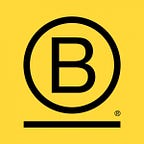4 Takeaways From Using a Human-Centered Design Approach to Create Company Culture
Examples and Guides From Plum Organics’ Approach to Product, Innovation — and the Workplace
A pioneer in healthy food for babies and toddlers, Plum Organics reimagined the options available for parents to feed their children. As parents themselves, the co-founders were committed to “nutritional intelligence” — the idea that early exposure to a wide variety of colorful and flavorful foods helps little ones to develop an appreciation for healthy foods later on.
B Corp Plum Organics, a pioneer in healthy food for babies in toddlers, was founded 10 years ago, and grew to be acquired by Campbell Soup Company in 2013. Through its growth, the company’s focus on community and the environment hasn’t wavered — this year, Plum Organics earned a place on B Lab’s 2017 Best for the Environment list.
Intentional Growth
Plum has been intentional in its approach to creating a culture that keeps values front and center, honors each employee bringing their full selves to the workplace, and allows space for the company to innovate and grow from the inside out. The culture of the company — a culture that values sustainability, community and the well-being of the next generations — has itself been innovated, following the same methods and principles Plum uses to create new product lines and flavors. Facing the internal challenges that come with scale and acquisition — keeping values aligned across multiple locations, preserving the core pieces of the company’s culture that make it special while giving it room to evolve, committing resources to all stakeholders — were important to the company in its definition of “success.”
In September 2015, co-founder Neil Grimmer asked Plum’s HR and Insights teams to use the company’s Human Centered Design (HCD) process to identify how unique elements of the culture make Plum Organics a great place to work. Plum describes its HCD process as “a method of innovation originating from IDEO and Stanford’s d.school that brings human needs and behaviors into the heart of the design process. The research process focuses on an extensive, empathy-based approach to users, experts, environments and the collaboration of a multidisciplinary project team. It necessitates an experimental mindset as teams engage in rapid ideation and prototyping that deliver products, systems, services or environments that are radically humanistic.”
The result of Grimmer’s request: a nine-month “Workplace of Our Future” project that resulted in a full report, available for other companies looking to follow suit and find ways to incorporate guidelines for growth that keeps flexibility.
4 Key Takeaways: Create an Inclusive Definition of Your Team and Culture
Plum interviewed more than 75 percent of its team with simple questions to learn things like: Who is the ‘work’ you? Who is the ‘home’ you? How do you cultivate well-being for yourself?’” The employees’ responses were illuminating, and helped set a path for the company to make improvements and start moving toward an environment that more fully welcomes its employees to participate in the company’s culture creation.
Below are the four leading takeaways from the process:
1. Make your company’s culture a strategic priority. It should be above your products and services. The people come first and we all know that happy employees help the bottom line. Use your entire company to create and define your culture. Don’t leave it up to the leadership team to define what the culture should be, especially if it’s one you want your employees to wholeheartedly accept and embrace.
2. Care for the whole individual well-being of your employee — your employee is a person with a family, a story, etc. and that must be recognized and nourished. Respect that life happens. Empower your team to share and get personal.
3. Assume goodwill, always. Don’t lead with cynicism and assume that once you open Pandora’s Box that something bad is inside.
4. Hire for values and live into them every day. If your company has a mission, make sure that your employees understand it and can live the behaviors every day. It starts at the recruitment process.
Plum Organics is part of the community of Certified B Corporations. Read more stories of people using business as a force for good in B the Change, or sign up to receive the B the Change Weekly newsletter for more stories like the one above, delivered straight to your inbox.
If you enjoyed this story, please click the 👏 button and share to help others find it! Feel free to leave a comment below.
The Mission publishes stories, videos, and podcasts that make smart people smarter. You can subscribe to get them here. By subscribing and sharing, you will be entered to win three (super awesome) prizes!
\
